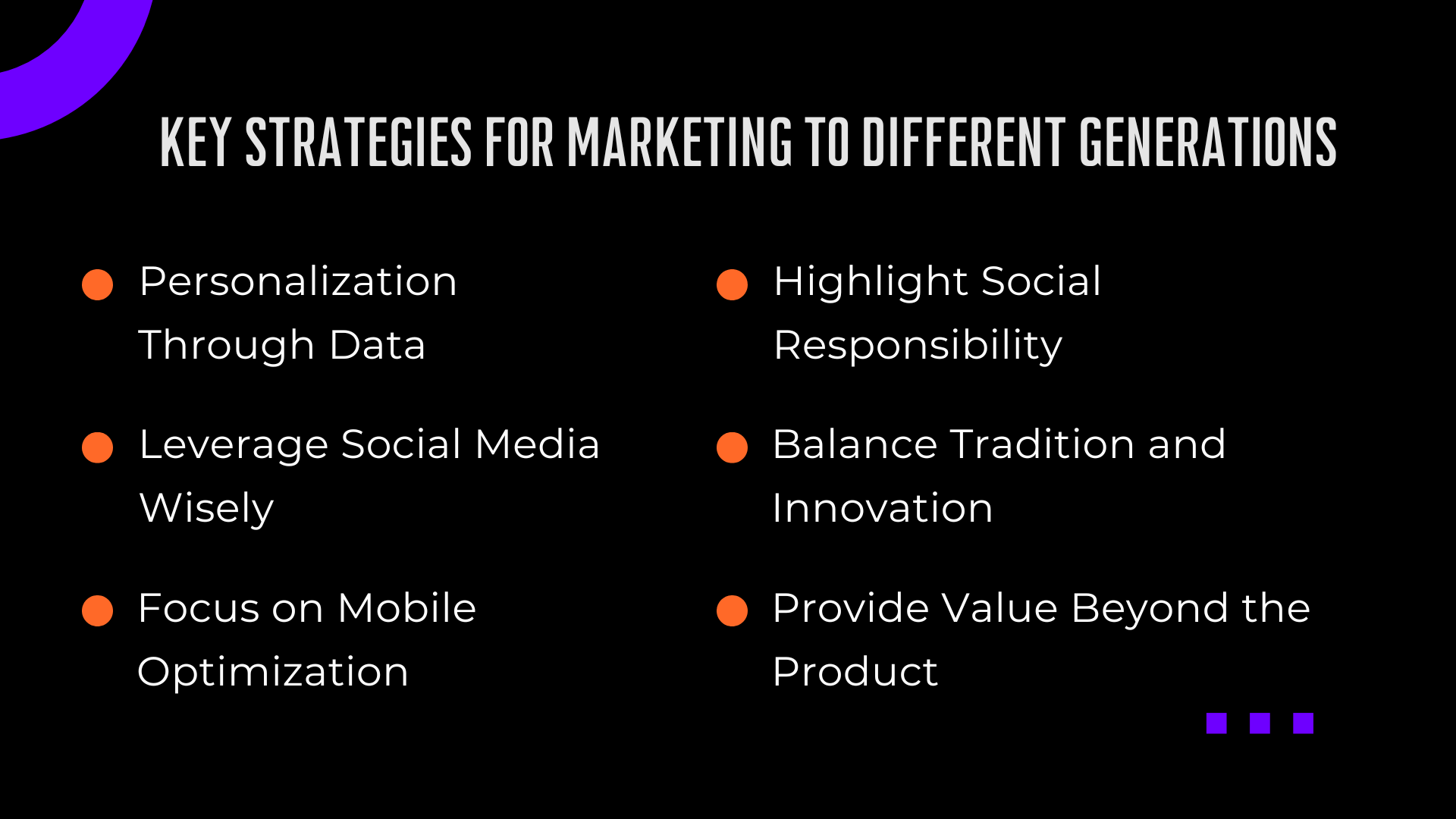Marketing to the Generations: Tailoring Strategies for Baby Boomers, Gen X, Millennials, and Gen Z
Any effective marketing strategy starts with a knowledge of your audience. Each generation responds differently to product and service presentations due to its tastes, behaviors, and values. Marketing to the generations lets companies create customized programs that specifically appeal to the particular motivations of every age group.
With targeted marketing efforts, generational marketing has many benefits:
- Relevance: Emphasizing a better knowledge of the priorities for every audience.
- Trust: Personalization strengthens bonds.
- Conversion: Using knowledge of focused tactics to produce outcomes.
This article discusses how to interact with Baby Boomers, Gen X, Millennials, and Gen Z and adapt to changing generational dynamics.
Baby Boomers (Born 1946–1964): The Trust Builders
Marketing to Generations: Understanding Baby Boomers
Built over years of hard-earned savings, consistent financial practices, and typically a concentration on long-term investments, Baby Boomers have great purchasing power. The 1946–1964 generation was raised in a post-war age of economic stability and conventional values, which affected their shopping behavior. Usually preferring brands with a strong reputation and proven track record, they value brand loyalty, trust, and products that provide actual quality. Baby Boomers want meaningful relationships and reliable solutions, so marketing communications emphasize reliability, authenticity, and connection. They also value simple, direct communication and are drawn to products and services that streamline their life while upholding strong standards.
Key traits include:
-
Brand loyalty is strong.
- Taste for long-term worth and confirmed excellence.
-
Financial stability and disposable income facilitate premium product purchases.
Marketing Strategies for Baby Boomers
-
Nostalgia and Tradition: Add narrative references to familiar themes, such as treasured experiences or cultural touchpoints from the 1950s to the 1970s. For instance, “simpler times” advertising might evoke emotion.
- Nostalgia and Tradition: Baby Boomers value in-person relationships even if they have adopted digital technologies. Provide excellent customer service and simple online platforms to strike the correct balance.
-
Practical Messaging: Emphasize the products’ long-term benefits, dependability, and longevity. People are less inclined to buy impulsively yet will buy quality, valuable things.
Gen X (Born 1965–1980): The Independent Thinkers
Who is Generation X?
Though they are at the height of their careers and have great buying power, Gen Xers are sometimes overlooked and sandwiched between Boomers and Millennials. The mid-1960s to early 1980s saw tremendous cultural and technological shifts, from personal computers to the Internet. Having lived in both the analog and digital domains, they are flexible but careful customers. Gen Xers are independent and resourceful, emphasizing quality above trends. Though they have a great impact, they are sometimes overlooked in generational conversations, hence they are an important but underused demographic for marketers.
Key behaviors include:
-
Hard-sell-resistant and skeptical.
- Practical and self-reliant.
-
Tech-savvy but values traditional communication.
Marketing to The Generations: Strategies for Winning Over Gen X
-
Authenticity is Key: Steer clear of flashy or loud claims. They like straightforward, honest communication.
- Multi-Channel Marketing: Gen Xers are comfortable exploring both traditional and digital media. Email marketing campaigns, direct mail, and Facebook or LinkedIn are used to reach them.
-
Time-Saving Solutions: Convenience is a big motivator given busy jobs and family duties. Show how your product saves time or simplifies life.
Millennials (Born 1981–1996): The Experience Seekers
 What Drives Millennials?
What Drives Millennials?
Experiences and deep ties are the values of this generation. Millennials buy brands based on principles, transparency, and social effects. They give lifestyle priority over worldly products and trend toward technology. They value authenticity in brand messaging and are drawn to companies that align with their personal values and social causes.
Key qualities include:
- Sustainability-focused, ethical shoppers.
- Experience preferences above tangible goods.
-
Online reviews and influencer suggestions dominate.
How to Connect with Millennials
Marketing to the generations born between 1981 and 1996 includes:
- Storytelling and Social Responsibility: Emphasize the beneficial things your brand does — through philanthropy or environmental projects. Your generational marketing strategy should feature powerful brand stories for sharing across social media platforms.
- Digital-First Approach: Invite Millennials who spend most of their time on social media. Draw attention using influencers, videos, and interactive material.
- Personalized Recommendations: Use information to deliver well-chosen experiences and offers based on their tastes.
Gen Z (Born 1997–2012): The Digital Natives
Who are Gen Z Consumers?
First-generation digital natives Gen Z has quick access to information and entertainment. They respect diversity, inclusivity, authenticity, and experiential learning opportunities. Given their short attention spans, this socially conscious generation chooses brands that share their ideals.
Key traits include:
- Digitally sensitive to visual-first content and fluent in them.
- Support inclusive, equitable brands.
- Attracted to gamified, interactive, creative events.
Strategies for Capturing Gen Z Attention
- Visual-First Content: Gen Z should be reached via Instagram, TikTok, and YouTube. Give shared visuals and short, exciting videos a priority.
- Interactive Experiences: Gamification and AR/VR promotion encourage creativity and curiosity.
- Inclusivity and Transparency: Emphasize your campaign’s integrity and high representation. Gen Z likes brands that admit faults and celebrate diversity.
Comparing the Generations: Key Takeaways
There are similarities in generational marketing techniques like emphasizing honesty and openness, but each generation contributes a distinct customer perspective molded by their experiences, values, and cultural influences. Millennials may appreciate convenience and digital innovation, whereas Gen Z values sustainability and diversity. Stay flexible when trends and priorities change and tailor your approach to these motivators, developing strategies that resonate strongly with their preferences. These generational differences can help you connect with your audience more deeply.
| Generation | Key Drivers | Best Marketing Strategies |
|---|---|---|
| Baby Boomers | Loyalty and trust | Leverage nostalgia and practical messaging |
| Gen X | Authenticity and efficiency | Multi-channel marketing and time-saving solutions |
| Millennials | Social impact and experiences | Storytelling and digital engagement |
| Gen Z | Inclusivity and creativity | Visual-first, interactive, and transparent campaigns |
Understanding these tendencies makes marketing to multiple generations more successful and impactful. Generational methods increase engagement and loyalty across varied audiences.
Adapting to Generational Shifts in the Future
Generational preferences change with time, technology, and world events. Long-term success requires flexibility and consumer data monitoring adjustments. As an example:
- Technology like AI will influence brand-consumer interactions across generations.
- Changing social values will make inclusivity, environmentalism, and empathy increasingly prominent in consumer values.
Understanding the larger factors affecting generational behavior can help you to prepare to handle these challenges.
15 Key Strategies for Marketing to Different Generations
-
Leverage Social Media Wisely: Understand where each age spends time online — Gen Z likes TikTok and Instagram, Millennials like Instagram and Twitter, and Boomers like Facebook.
- Focus on Mobile Optimization: Millennials and Gen Z use mobile devices, so make your website and digital marketing mobile-friendly.
- Highlight Social Responsibility: In your messaging, emphasize diversity, sustainability, and philanthropy since values influence buying decisions across generations.
- Balance Tradition and Innovation: TV and radio may appeal to older generations, but younger audiences prefer interactive and immersive advertising.
- Email Marketing for Boomers: Baby Boomers are still engaged by email. Make professional, unambiguous, value-driven messages.
- Video Content for Gen Z and Millennials: Instagram, TikTok, and YouTube thrive on short, entertaining, visually appealing videos.
- Provide Value Beyond the Product: Emphasize how your brand helps. Younger generations emphasize innovation and effect, whereas older generations favor reliability and quality.
- Engage Through Storytelling: Include in your content marketing strategy personal, honest stories. Each generation values narratives that reflect their identities and experiences.
- Personalization Through Data: Customize marketing to multiple generations with customer data. Age groups respond to messages that address their needs and interests.
- Make Loyalty Programs Generationally Relevant: Provide discounts for cost-conscious Gen X and early access or exclusivity for Gen Z in loyalty programs.
- Use Influencers Strategically: Younger generations trust influencers while buying. Work with brand-aligned influencers who appeal to your audience.
- Educational Content for Gen X and Boomers: Engage these generations, who value educated decision-making, via thorough blogs, guidelines, and tutorials.
- Real-Time Engagement: Prioritize live conversations, user-generated content on social media, and livestreams for Gen Z and Millennials.
- Seamless Online Shopping Experiences: To attract Millennials and Gen X, create simple, secure, and intuitive e-commerce experiences.
- Adapt Messaging Over Time: Be flexible and adapt the marketing strategy to new trends and technologies as different age groups’ preferences change.
By understanding each generation’s traits and goals, marketers may build customized ads that appeal to varied groups.
Conclusion: Bridging Generational Gaps in Marketing
Fundamentally, great marketing to the generations is about empathy, understanding, and real connection. Every generation has its own values, attitudes, and preferences formed by cultural, social, and economic events. Customizing the strategies to fit these specific characteristics can help you to produce campaigns that really appeal. This method helps you fulfill the needs of each group and generates trust, loyalty, and lasting relationships with your audience, keeping your brand current and relatable across generations.
Ready to create marketing strategies that truly connect with every generation? Partner with Webugol Agency to start building meaningful relationships with your audience today!


